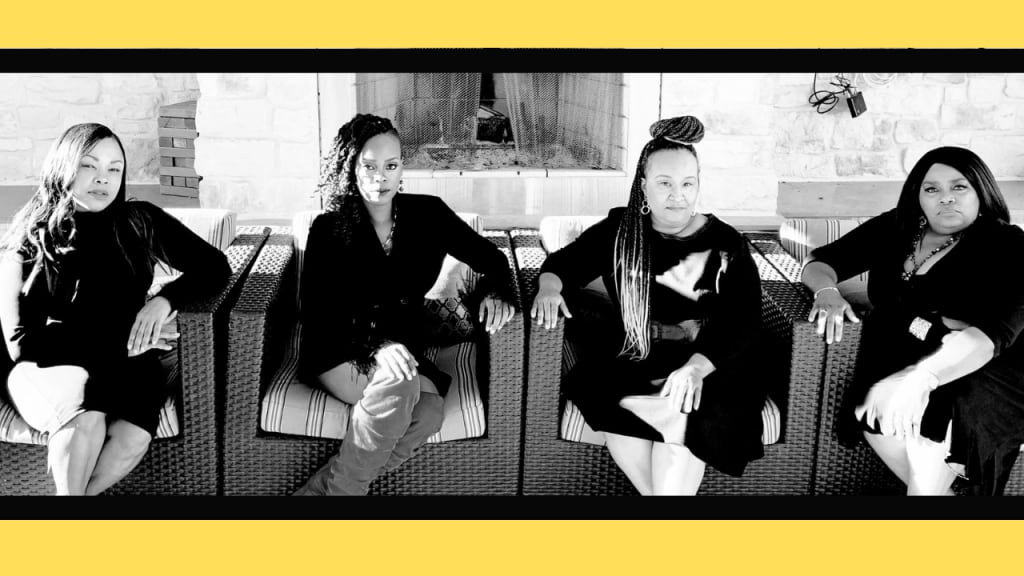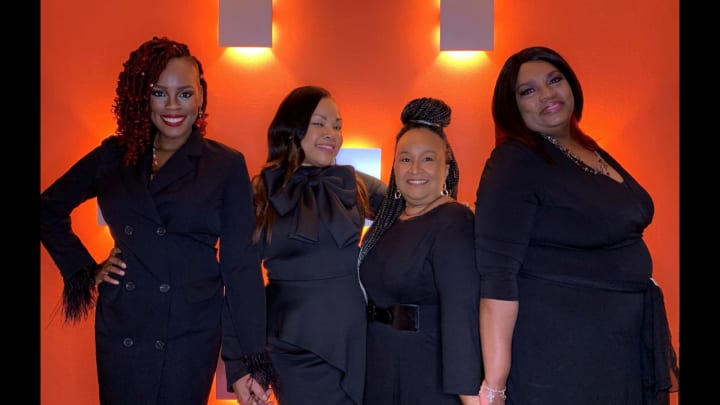There Is No Box
For Creatives of Color, Love is not Enough.

Let’s talk about boxes, particularly ones that do not exist.
Somewhere in the collective consciousness of the power-player creatives of theatre, a box of stereotypical conventionality exists. A creative that breaks away from this conventionality is thinking “outside of the box.” But if one must think outside of the box to establish any semblance of creative individualism, why are we allowing the confining box to decide our choices for us in the first place?
If I have a box I want to remove from my house, I break it down and put it in recycling.
Who am I kidding? I make my husband do that stuff.
But, I digress.
Some boxes are not ideal for recycling. Some boxes need to be taken away with the trash. The only solution is to add them to a pile of rubbish and allow time and mother nature to break them down until they are unrecognizable. They must be allowed to decay until no one would ever suspect the box existed. It is one thing to destroy a real box. Killing an invisible box of prejudiced ideas is quite another. Ideas are pesky little suckers. Some ideas just do not want to die.
In the heart of central Texas, near Austin, a group of outstanding creatives is working towards change. Four women of Color, collectively called Shades of Talent, are destroying the imaginary box’s idea.
When I started working on this piece, I did so intending to write about a group of creatives I genuinely admire. I sat down with company founders Erica Roberts, Lynette Burton, Kendra Christel, and Nkere Richards and left learning a few lessons.
Shades of Talent’s mission is to “encourage and promote the awareness, participation, and casting of Black, Indigenous, and People of Color in local theater.”
The following is a partial transcript of that conversation. Shades of Talent has permitted me not only to write and publish this story but to have use of their photographs.
Tell the world what you do.
Kendra Christel: Magic.
Nkere Richards: Bring awareness to the contributions of Black people and People of Color in this environment. It doesn’t feel like we have that type of platform so much. It doesn’t feel like we have the representation that we need so much. It’s about giving people who are part of the community who want to act, want to sing, and want to be a part of what we’re doing right now; it’s about giving them the platform to do that.
Lynette Burton: We have an array of ages, experiences, ideas, gifts, and talents. To me, that’s important. Because it’s showing the community that these are women, and they’re out there doing something, and they’re hitting the ground every day.
Nkere Richards: In an unpretentious way. Because sometimes, we do come across some organizations that do somewhat what we do, but they don’t necessarily make you feel welcome.
Kendra Christel: When the riots and protests broke out across the country, I wanted to do something for Black people. I wanted to do something to help my community. My favorite thing to tell myself is 'start where you are, use what you have, and do what you can.’ When Erica reached out about this idea, I was definitely on board because I thought this is it. This is the thing. There’s an entire Black community in my face. And we're lacking something, which is representation. We're lacking space to be creative and be equal. At the same time, we're lacking an audience, and we're lacking opportunity. And art saves lives. I do believe it.
Lynette Burton: Every day.
Kendra Christel: Art saves lives, and there are so many lives that need saving. We need a break from the day-to-day and the worrying and somewhere to express ourselves. Theatre isn’t just entertainment. Doing this is my way of contributing to my community, giving us this thing that we need, and saving our lives. That’s why I do it. And lately, I’ve been wondering how we can create our renaissance here. There is so much talent in Black art. How can we work together with other theatres and other collectives and create an entire renaissance? How can we draw those eyes to us? That’s why I do this. I guess that’s what I do. I save lives and create renaissances.
Erica Roberts: I love that.
Nkere Richards: Me, too.
Lynette Burton: Round of applause.
[Laughter from the group.]
Erica Roberts: I think what I do is just listen to the universe and go where it tells me to go. There was a desire or need to do something. I just didn’t know what. So, the universe was slowly talking to me and letting me see things. With the pandemic, everybody felt the loss of theatre and performing arts; Everything was on lockdown. But then I started noticing people being creative, using social media in more ways. All the racial awakening exploded in 2020. I just started having conversations and listening to people in the arts about how theatre needs to progress and start exploring and showcasing more People of Color and telling our stories. I thought you know what? I’m going to reach out to my sisters and ask them something. And I thought they were going to think I was crazy.
Kendra Christel: Well, we do. We do.
[Laughter.]
Erica Roberts: This is how awesome these ladies, my sisters, are. I just sent out a message saying, “What do you think if we put together some videos of us singing? We could put them up once a month, a regular segment once a month, and get them on social media. We’re all singers and performers at heart. It would help feed that need for us, and to give us, Black women, more presence”. And then somebody said we could add this, and add that, and then it just evolved. The synergy between this group of women- I can’t even describe it. It’s amazing.
Nkere Richards: The way things fell into place so easily for us. It was meant to be.
Erica Roberts: It was the universe.
Lynette Burton: We’re doing more with less. We’re doing it because we want it to be the way we want it to be.
Erica Roberts: We’re scrappy, but things look very professional. We’re on a shoestring budget.
Kendra Christel: I think we’re the barebone of ‘start where you are, use what you have, do what you can.’ All these things are working for our good. We couldn’t have mapped this out any better.
Nkere Richards: You guys push me in ways I wouldn’t push myself.
What do you want to say to young creatives of color right now?
Lynette Burton: Only you can block you from being who you want to be. That’s always been my mantra. You limit yourself. People don’t limit you.
Erica Roberts: Have faith in yourself, even if nobody has faith in you. Explore. To me, failing is just not even trying. If you’re trying, you may not have the outcome or anticipated outcome, but sometimes the universe gives you what you need and not always what you want. What you see as failure could just be a passage into another door that you didn’t even think could open for you or would even consider exploring.
Nkere Richards: I remember as a kid having a feeling of not fitting in. You don’t have to feel like you’re alone. You don’t have to feel like there aren’t people out there who think the way you do, or along the same lines, who aren’t trying to churn through the same things you are. You’re not alone.
Kendra Christel: I would say, find your tribe, man.
Nkere Richards: That’s it.
Kendra Christel: Things are so much different when you just find your tribe. Once you find that tribe, you don’t even have to try at half the things. It just manifests when you are in the right company. Rest. Do the work. Work on yourself. Work on your craft. Work on your health. Work on your mental health. Start before you’re ready. Go for it. Punch it. Do the things. Learn the things. Fail at the things. Start where you are and do every little thing you can because you’ll get more when you do. If you have a dream, it doesn’t matter who’s for it or against it; go for it. Shoot for it like your life depends on it, and you hold on for dear life. You should work so much for the things you want and the life that you want that if you were to die tomorrow, you would slide into heaven exhausted. It sounds like the toxicity of grind culture, but really if you work at the life you want, you’ll find so much happiness. Work on yourself. My favorite work to do on myself is to eat spaghetti in the bathtub.
[Laughter.]
Nkere Richards: I got a visual.
Kendra Christel: There doesn’t have to be water in the tub. I’m just sitting in the tub eating pasta in my happy place. It makes me happy because when I get out of that tub, the spaghetti is gone. I’m ready to conquer anything.
Erica Roberts: Don’t you see that as an album cover for Kendra?
Kendra Christel: It’s one of my favorite things to do. Just sit in the bathtub and eat spaghetti. It makes me happy.
Erica Roberts: I don’t think I ever knew that.
Kendra Christel: Well, you probably didn’t. I don’t go around sharing it.
Nkere Richards: I want to underscore, find your tribe.
Lynette Burton: You guys are so much like my family that if I don’t hear from you guys or see you, I feel like my orbit is off. We’re so in sync that it just doesn’t work if one piece is missing.
What can white creatives, patrons, and allies do to help artists of color?
Lynette Burton: If they’re sincere about helping- if they start, they need to follow it all the way through. If it’s financial, mental support, strategic, whatever it is, follow it all the way through. Be consistent with us.
Nkere Richards: If a company, or organization in general, is invested in Black Lives Matter or representation only because it’s trendy- we pick up on that. I want to know that someone is fully invested. We don’t need temporary support. It needs to be a long-term investment.
Erica Roberts: Ask. How can I help? If you know you want to help but don’t know how to help, ask. Sincerity comes across. If you don’t have the answers, it’s okay. But if you know you want to help and you want to be of help, just say, “Hey, what can I do?”
Kendra Christel: I don’t even know where to start. Support and respect. Come to our shows. Give to us like you would any other theatre. Don’t whitewash our sh-t. Be respectful. Respect us as artists as well. We don’t want our art to be looked at as less than because you don’t understand our struggle. Respect us and support us. Give us our space to be creatives.
Nkere Richards: And not just on Martin Luther King Day. Not only during Black History Month. Not just Juneteenth. It needs to be a long-term investment. Representation- A lot of companies do focus on representation, but their idea is very limited.
Kendra Christel: And let us be in the room where it happens. I was thinking about this. At [a theatre that will remain unnamed], the staff was white even before it was a skeleton crew. There were no Black choreographers, no Black stage managers, no Black directors, no Black set designers. None of that. We need that as well. I’d like to see more, not just on stage, but behind the scenes. Black crew members and things like that. Make it a point to include us in all the spaces, and not just for somebody’s entertainment. There’s more than one type of creative. Where are the Black plays? When you include us, include us in all the things. Don’t just include us where it’s convenient.
Nkere Richards: Where it’s trendy.
Erica Roberts: One of Shades of Talent’s missions is to encourage creatives of Color in every aspect of theatre. There are still a lot of Black and Brown kids growing up that think, “I can’t do that. That’s not for me.” And that’s what we want to say. Yes, you can. You want to write. Yes, you can. You want to sing. Keep singing, and your voice will be heard. You have a story to tell. Tell that story. That’s the core of what we are aiming to accomplish. I’m thinking of Amanda Gorman. How many little Black girls saw Amanda Gorman? For her to be so young, and she’s been writing all her life. She knew what she wanted to do, and she kept pushing and pushing. I hope to see a lot more Amanda Gormans.
Nkere Richards: It just goes to say, sometimes people just need a platform, and she clearly got her little platform, and that’s all she needed.
Lynette Burton: And she’s springing.
Erica Roberts: I hope that we, in what we’re doing, create other platforms for other People of Color. Not just Black. We’re here to represent all People of Color.
What does the world need right now?
Nkere Richards: Love.
Kendra Christel: [Sings] Love, sweet love.
[I think to myself, I deserved that.]
Lynette Burton: It does because there’s such a division right now in the United States. Speaking as a veteran, I see things that most people wouldn’t see because I am a veteran. One of the oaths we take in the military is to protect and defend from foreign as well as domestic. We shouldn’t even need to have domestic in there, but we have to.
Kendra Christel: I wouldn’t say that America needs love. It doesn’t seem like a viable solution. That doesn’t mean that we don’t love each other. We had a leader that divided us, and even during this division, we had close friends and close family that didn’t agree, and it was shocking, but they still loved each other. They couldn’t agree on this thing, and no one was willing to budge. I think what we need is change. Those of us who are oppressed, and those of us who are mistreated, are tired of being told to love the people who oppress us. No, we need action. It is so hard to love a person who is blindly hating and discriminating against you. That’s where that division comes from. We can’t love past that hate anymore.
Nkere Richards: And it’s not just here. It’s not just in America.
Kendra Christel: Right. Exactly. It’s not just an American thing. I think we have love. I think the love is evident in what we do for our country and what we do to stay in this country. Because we could pack up and go somewhere else, but I don’t want to. This is my home. This is where I was born. I am an American. So the love is definitely there. It’s just that love isn’t enough. We need change. We need accountability.
Lynette Burton: I think we need to stop making excuses for people.
Nkere Richards: Show some compassion. Show some humanity. Respect my ideas even if you don’t necessarily agree with them. I think we’re missing a bit of that.
Erica Roberts: I think we’re also missing a sense of community. There’s something so powerful in the whole ‘It takes a village’ idea. We’re missing that community—that sense of a village. I think a lot of people feel disconnected. You know love is one thing, but you have to have that connectivity and that sense of community. It is very easy to speak up when you feel connected. When somebody in your community is being treated unfairly, you can love somebody, but when you feel connected, you go further. You have someone’s back.
Nkere Richards: I think the world needs more art. Art brings people together.
Lynette Burton: It does.
Nkere Richards: Art creates that community that you speak of, Erica.
Kendra Christel: It’s so easy to spiral into this bad place. It’s so easy to spiral further down because of Covid. Art is being snuffed out.
Lynette Burton: It is. It is.
Kendra Christel: We’re gasping for air because all of our art outlets are becoming fewer and fewer. Theatres are having to turn their lights out permanently. It’s terrible. It’s terrible that there are people who, even now, don’t know how important art is. Art is important. We need more art. It makes you laugh. It makes you cry.
Lynette Burton: It makes you think.
Kendra Christel: You see the stories, and you think, “Hey, I’m not the only one.” That’s what art does. It makes you feel less alone.
Erica Roberts: It’s the human connection. It reminds you that human connection crosses racial and economic lines—a basic human connection.
Kendra Christel: When you work in corporate America, sometimes they play games that I just cannot play. I’m the only Black person on the team. I’m not going to play, ‘Guess the baby.’ You’ll know it’s me. They ask the questions like, “If you could go back in time to any decade, when would it be?” I don’t want to go back. I’m barely surviving here and now. Be inclusive in ALL aspects, places, and spaces. Be inclusive. Put forth effort. It’s a hard thing. It’s hard now because you’ve never tried to be inclusive before. But it becomes easier. It becomes second nature.
Lynette Burton: You go to an interview, and the first thing they say is, “We need you to think outside of the box.” I have a problem with that because that would imply that I’m stagnant. I was somewhere where I couldn’t do anything. I’m not that kind of person. I am a creative person. So, I was never in a box. If you say I need to think outside of the box, you’re saying I was never that way, and I have a problem with that term.
Erica Roberts: Black people in general- we always think outside of the box. A lot of opportunities don’t come to us the same way they do to others.
Nkere Richards: There is no box.

We said our goodbyes and ended our Zoom call. I contemplated everything I had just heard.
I’m a teacher of writing, acting, and improvisation. While teaching an online course a few months back, some of my students wanted to play the “Guess the baby” game. I had a bunch of ten and eleven-year-olds in this class, and all but one were white. One child was a Person of Color. She spoke up and said that she might not be able to play this game, where everybody submits a photo of themselves as a baby, and everyone takes turns guessing which baby is which.
The other students didn’t understand why she would not feel comfortable playing the game. One even said, “Well, I guess you just won’t be able to play this game, but you can play others.”
I had never come across a situation like this. I looked at my student of color. She was eleven years old and an exceptional writer. I will always remember the look of disappointment and hurt on her face. I grasped for an answer that would give everybody the ability to play the game. As a teacher, I’m always trying to find ways to please them all.
I suggested that everybody turn in black and white photos of themselves, instead. One child asked why. Before I could answer, another student spoke first, “Because then we’ll all be the same color, and ------ can play.” Still, not all the kids understood. Some complained that they wanted their pictures to be in color. I told them that if I were to turn in a picture of myself, they would know it was me if the photo was in color. All of my baby pictures looked old.
My student of color asked if they could turn caricatures of themselves instead. Everybody else loudly complained. I said that everybody could choose to bring a photo or a caricature. She smiled broadly and told them they could play however they wanted and not to worry about her. At the end, when everybody showed up with their photos, she turned in a caricature she had drawn of herself. It was easy to guess which picture belonged to her. She was the only one with a caricature.
She did not live inside a box. There was no box for her.
I’ve been thinking about a lot of things. I’ve been thinking about all the things I could have done better. I’ve been thinking about moments in my life where I dropped the ball. Even in this piece’s editing, I’ve found that grammar, itself, can live within that invisible box.
A few years ago, as I was doing some holiday shopping at a big supercenter chain, I found myself walking down the aisle of tree ornaments. I looked at a section of brightly dressed ballerinas. All of them were white.
I kept walking.
Eventually, I found that every Santa was white. Mermaids were white. Elves were white. Every ornament with a human-like character was white. I didn’t know at the time that real-life ballerinas of color still didn’t have ballet shoes that matched their diverse skin tones. I didn’t think they had to dance in peachy-beige toe shoes.
Recently, I read an article about how that is changing. I wondered how many people had to speak up before someone rectified that error. What other things are we overlooking because, whatever it is, we haven’t had to struggle with it personally?
Out of sight. Out of mind.
The truth is that it will be impossible to please everybody until everybody learns to empathize with everybody. Even in a classroom of innocently ignorant children, if you can’t please everybody, remember that love is not enough, and every great lesson is worth learning.
Those who choose to stay inside the box and believe that it is real will never see the world’s beautiful diversity outside of it. Every student of this life, no matter how old, can be re-taught, including me.
One lesson at a time.
***
I hope you've enjoyed this story. As always, ten percent of ALL proceeds from reads and tips from my Vocal stories go to The Bee Conservancy, a non-profit organization that strives to help those precious pollinators. I intend to enter this particular story, 'There Is No Box,' into the 'Black in Business' challenge. If it is accepted in time and happens to place, I pledge to give any prize winnings to Shades of Talent. As they themselves have said, we must follow through on our promises.
Sincerely,
Kathryn Susanne Sterling
About the Creator
Kathryn Susanne Sterling
Kathryn Susanne Sterling is the author of Edith, Awake: Part One of The Name Series. Her second novel, The Anomaly, will be released in 2021. She lives in Texas with her husband, John, three assassin cats, and one overly emotional dog.
Enjoyed the story? Support the Creator.
Subscribe for free to receive all their stories in your feed. You could also pledge your support or give them a one-off tip, letting them know you appreciate their work.






Comments
There are no comments for this story
Be the first to respond and start the conversation.